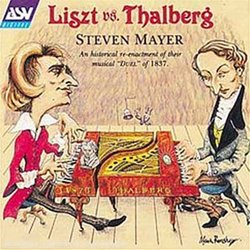| All Artists: Liszt, Thalberg, Steven Mayer Title: Divertissement Sur La Cavatine Members Wishing: 1 Total Copies: 0 Label: Asv Living Era Release Date: 12/17/1993 Genre: Classical Styles: Forms & Genres, Fantasies, Short Forms Number of Discs: 1 SwapaCD Credits: 1 UPC: 743625078329 |
Search - Liszt, Thalberg, Steven Mayer :: Divertissement Sur La Cavatine
 | Liszt, Thalberg, Steven Mayer Divertissement Sur La Cavatine Genre: Classical
|
Larger Image |
CD Details |
CD ReviewsGood News vereza | Brazil | 09/14/2000 (4 out of 5 stars) "This recording presents new pieces that are very difficult to play and to find in other recordings. I was acquainted to Mr. Thalberg through this recording. This recording has some special points to be considered : 1st - If you don't know Thalberg, buy it.... 2nd - There is a Webern piece that is very good too.Liszt's Benediction de Dieu dans La Solitud has a beautifull sound here. But, if you are trying to find something of good taste, try others... This CD is a show of great technical skills achieved." Battle of the salon stars The Sanity Inspector | USA | 02/09/2001 (4 out of 5 stars) "This is an interesting recreation of a competition between two of the foremost European pianists of the mid-19th century. All of the selections are showcases for each performer's reputed strengths, as well as making for rewarding listening. Stephen Mayer does a wonderful job imagining the styles of Liszt and Thalberg. The Liszt selections are dramatic; while the Thalberg pieces are more cultured-sounding, almost limpid. Comparing them is a case of apples and oranges, here as it was at the time, so the verdict remain: "a tie"." For the Thalberg Completist or Collector of Liszt Rarities Hexameron | 08/02/2007 (4 out of 5 stars) ""The greatest interest... will be without question the simultaneous appearance of two talents whose rivalry at this time agitates the musical world, and is like the indecisive balance between Rome and Carthage. Messrs. Liszt and Thalberg will take turns at the piano" - an advertisement in the Gazette Musicale on March 26, 1837.
The famous duel between Liszt and Thalberg, or "Rome" and "Carthage," has spawned legendary anecdotes and quotations about the two pianist-composers. Not all of it is true, and the famous Liszt biographer, Alan Walker, sheds light on the truth of the matter: "There is nothing here to suggest that Liszt saw in Thalberg a rival. Least of all did he 'rush back to Paris, nostrils dilated, to defend his crown,' as one modern journalist has put it." But when Liszt's mistress, Marie d'Agoult, used his name to write disparaging remarks about Thalberg's music, a war of the press began, sides were drawn, and a "battle" between the two pianists was inevitable. Thalberg and Liszt performed their own recitals in Paris, both taking advantage of the Parisian fervor, and eventually collided in a musical duel under Princess Belgiojoso's roof. This recording presents an almost historically accurate program of what was played during the evening of the duel. I say "almost" because Liszt's "Benediction de Dieu dans la solitude" had not yet been composed. While Mayer's interpretation of the Benediction is acceptable, demonstrating a balance of passion and judicious touch, I don't know why it was tacked on. Both in his own concerts and in the famous duel, Liszt showcased his powers with the devilish Fantasy on Pacini's "Niobe" and the remarkable transcription of Weber's Konzertstück in F minor. I am only familiar with Leslie Howard's renditions of these pieces, but Steven Mayer is decent in his performance. He creates veritable excitement out of the Niobe Fantasy and reveals deep insight into Weber's Konzertstück. The Konzertstück, in particular, covers an incredible range of emotions, from the greatest sorrow and longing to ecstatic hope and jubilance. Thalberg's two war-horses, the Fantasy on Rossini's "Moise" and Fantasia on "God Save the Queen," are exquisite examples of Thalberg's art. Unfortunately, Mayer's execution of the Moise Fantasy is weak and uneven. In the first half of the piece his phrasing is clumsy, his emotions are absent, and his tempo is excessively fast. This is not the best exhibition of Thalberg's finest piano fantasy, and I would implore the curious to seek out Francesco Nicolosi's divine performance here: (Fantasias on Operas By Rossini). However, you will not find the Fantasia on "God Save the Queen" anywhere else, and as a Thalberg completist, that was the primary reason I bought this CD. The Fantasia is brilliant and guilty of melodious and flashy embellishment; it's pure fun. Bottom line: There are some mighty enticing Liszt rarities here, and I can vouch for the Weber Konzertstück as a composition worthy of revival. But if you are genuinely interested in the music of Thalberg, I must whole-heartedly suggest Francesco Nicolosi's interpretations, instead; he is head of the Thalberg International Study Center, an accomplished pianist, and a real champion of Thalberg's music." |

 Track Listings (5) - Disc #1
Track Listings (5) - Disc #1